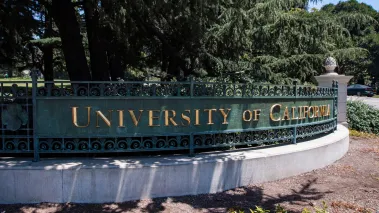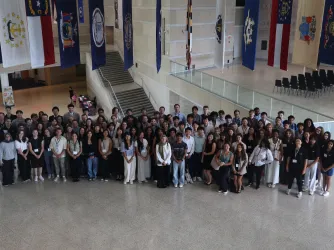Table of Contents
State Department’s Anti-Semitism Definition Would Likely Violate First Amendment on Public Campuses

gary yim / Shutterstock.com
In a radio interview yesterday, University of California President Janet Napolitano stated that she believes the UC system should adopt the U.S. State Department’s definition of anti-Semitism. Responding to recent calls from rabbis, faculty, and alumni for the UC system to adopt the definition, Napolitano told Jeremy Hobson of Here & Now that the Board of Regents will vote on the proposal in July. However, if adopted and used as the basis for discipline by a public university system, the State Department’s definition of anti-Semitism would likely violate the First Amendment by prohibiting protected expression.
The definition, authored by the European Monitoring Center on Racism and Xenophobia, reads:
Anti-Semitism is a certain perception of Jews, which may be expressed as hatred toward Jews. Rhetorical and physical manifestations of anti-Semitism are directed toward Jewish or non-Jewish individuals and/or their property, toward Jewish community institutions and religious facilities.
The State Department provides further examples of anti-Semitism:
- Calling for, aiding, or justifying the killing or harming of Jews (often in the name of a radical ideology or an extremist view of religion).
- Making mendacious, dehumanizing, demonizing, or stereotypical allegations about Jews as such or the power of Jews as a collective—especially but not exclusively, the myth about a world Jewish conspiracy or of Jews controlling the media, economy, government or other societal institutions.
- Accusing Jews as a people of being responsible for real or imagined wrongdoing committed by a single Jewish person or group, the state of Israel, or even for acts committed by non-Jews.
- Accusing the Jews as a people, or Israel as a state, of inventing or exaggerating the Holocaust.
- Accusing Jewish citizens of being more loyal to Israel, or to the alleged priorities of Jews worldwide, than to the interest of their own nations.
FIRE has no position on whether this definition of anti-Semitism is correct, or whether it is better or worse than any other. But it doesn’t matter; as government actors, public university systems like the University of California cannot lawfully maintain and enforce policies that prohibit speech protected by the First Amendment. With the exception of certain well-defined categories of speech implicated by the first example provided here—speech that constitutes incitement, intimidation, or true threats—the expression described here by the State Department is generally protected by the First Amendment.
If these examples are turned into enforceable restrictions on free speech, certain criticisms of the Jewish faith or of Israel would be grounds for punishment, a viewpoint-based restriction on expression that cannot be squared with freedom of expression. That these criticisms may be bigoted or even false does not mean they may be silenced or punished by government action. As the Supreme Court recently held in United States v. Alvarez, 132 S. Ct. 2537, 2550–51 (2012):
[S]uppression of speech by the government can make exposure of falsity more difficult, not less so. Society has the right and civic duty to engage in open, dynamic, rational discourse. These ends are not well served when the government seeks to orchestrate public discussion through content-based mandates. … Only a weak society needs government protection or intervention before it pursues its resolve to preserve the truth. Truth needs neither handcuffs nor a badge for its vindication.
There is no doubt that many would find the expression outlined in the examples to be gravely offensive. But one foundational principle of First Amendment jurisprudence, reinforced in decisions dating back decades, is that speech does not lose protection simply because some, many, or even all find it offensive. As the Supreme Court observed in Texas v. Johnson (1989), a decision vacating a man’s conviction for burning the American flag under a state flag desecration statute, “the government may not prohibit the expression of an idea simply because society finds the idea itself offensive or disagreeable.” That principle remains true whether the expression at issue is burning the flag or anti-Semitic speech. Similarly, in Snyder v. Phelps (2011), a case concerning the Westboro Baptist Church’s picketing of an American soldier’s funeral, Chief Justice John Roberts wrote:
Speech is powerful. It can stir people to action, move them to tears of both joy and sorrow, and—as it did here—inflict great pain. On the facts before us, we cannot react to that pain by punishing the speaker. As a Nation we have chosen a different course—to protect even hurtful speech on public issues to ensure that we do not stifle public debate.
The ongoing national commitment to freedom of expression described by Chief Justice Roberts is especially important for our public colleges. The Court has long recognized that public debate must be at its most free on campus, noting that “[t]he essentiality of freedom in the community of American universities is almost self-evident.” Sweezy v. New Hampshire (1957).
It is very important to note that federal anti-discrimination laws already prohibit discriminatory harassment based on a student’s religion, national origin, and actual or perceived shared ancestry or ethnic characteristics. Generally speaking, if such speech is so severe, pervasive, and objectively offensive that it effectively denies a targeted student the ability to participate in his or her college’s programs, then it constitutes discriminatory harassment and is not protected by the First Amendment.
It is useful to note here that the Department of Education’s Office for Civil Rights (OCR) has made clear that certain types of anti-Israel or anti-Jewish speech, standing alone, do not create a hostile environment, and therefore do not lose protection as actionable harassment. (OCR is the federal agency responsible for enforcing Title VI’s prohibition against discrimination on the basis of national origin and actual or perceived shared ancestry or ethnic characteristics at colleges and universities that receive federal funding.)
In 2013, OCR investigated and ultimately rejected hostile environment complaints filed by University of California, Berkeley students concerning an anti-Israel protest, a student’s offense at a classroom discussion perceived as anti-Israel, and anti-Jewish statements made in student government, among other claims. OCR concluded that the incidents did not constitute actionable harassment, stating, “In the university environment, exposure to such robust and discordant expressions, even when personally offensive and hurtful, is a circumstance that a reasonable student in higher education may experience.” OCR cited its 2003 “Dear Colleague” letter on the First Amendment in support of its conclusion that “[t]he offensiveness of a particular expression, standing alone, is not a legally sufficient basis to establish a hostile environment.” Adoption of the State Department definition of anti-Semitism would bring the UC system into tension with both OCR’s enforcement of federal anti-discrimination law and, more importantly, the First Amendment.
Three years ago, in response to similar concerns about anti-Semitic speech on campus, the University of California’s Advisory Council on Campus Climate, Culture and Inclusion issued recommendations to former UC System President Mark Yudof that included a call to “push its current harassment and nondiscrimination provisions further” and “seek opportunities to prohibit hate speech on campus.” The Council acknowledged the First Amendment concerns, but nevertheless advised Yudof to “accept the challenge” of the litigation that would surely ensue were its recommendations to be adopted.
As FIRE pointed out in a letter to Yudof, were he to adopt the Council’s recommendations, he would risk personal liability for violating clearly established law. We warned Yudof that “[i]n a fight against the Bill of Rights, UC will not win—nor should it.” Recognizing the folly of deliberately and knowingly violating the First Amendment—and the risk of a costly courtroom loss—Yudof issued letters to “Concerned Members of the UC Jewish Community” and FIRE, recognizing the community’s concerns but declining to stretch UC policies beyond the First Amendment’s breaking point.
Yudof reached the right decision, and he wasn’t alone in his conclusion. First Amendment expert and law professor Eugene Volokh likewise criticized the report’s recommendation and praised Yudof for his response, as did fellow First Amendment expert and professor Alan Dershowitz. Both Volokh and Dershowitz warned that any ban on so-called “hate speech” could be wielded against unintended targets—including proponents of Israel.
While the State Department’s definition is arguably more restrained (though similarly constitutionally suspect), President Napolitano and supporters of adopting the State Department’s definition should recall Volokh’s and Dershowitz’s warning. Setting aside the First Amendment lawsuit that would follow a decision from the UC Board of Regents to adopt this definition, if the UC System attempts to carve out an exception to the First Amendment for one group, other groups will soon thereafter demand similar treatment, lobbying for new First Amendment loopholes that might allow for silencing viewpoints they’d rather not hear. The classic law school notion of the “slippery slope” problem has become cliché precisely because it describes a common phenomenon, and recognizing new categories of unprotected speech presents a very slippery slope indeed.
FIRE closed our 2012 letter to Yudof by citing Supreme Court Justice Louis D. Brandeis’s concurring opinion in Whitney v. California (1927):
Those who won our independence believed … that freedom to think as you will and to speak as you think are means indispensable to the discovery and spread of political truth; that without free speech and assembly discussion would be futile; that with them, discussion affords ordinarily adequate protection against the dissemination of noxious doctrine …
They recognized the risks to which all human institutions are subject. But they knew that order cannot be secured merely through fear of punishment for its infraction; that it is hazardous to discourage thought, hope and imagination; that fear breeds repression; that repression breeds hate; that hate menaces stable government; that the path of safety lies in the opportunity to discuss freely supposed grievances and proposed remedies; and that the fitting remedy for evil counsels is good ones.
Fear of serious injury cannot alone justify suppression of free speech and assembly … To justify suppression of free speech there must be reasonable ground to fear that serious evil will result if free speech is practiced … [N]o danger flowing from speech can be deemed clear and present unless the incidence of the evil apprehended is so imminent that it may befall before there is opportunity for full discussion. If there be time to expose through discussion the falsehoods and fallacies, to avert the evil by the process of education, the remedy to be applied is more speech, not enforced silence.
[Emphases added.]
When it comes to responding to bigoted or offensive speech, Justice Brandeis’s words still ring true and provide the best way forward. We hope his advice will be heeded once more.
Recent Articles
Get the latest free speech news and analysis from FIRE.

In Philly, a new generation finds it voice — and the tools to defend it

Say it with a song

Will free expression make a comeback at Haverford College?
